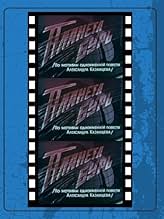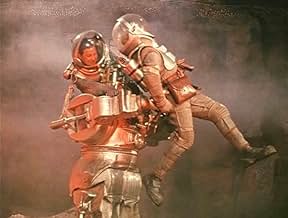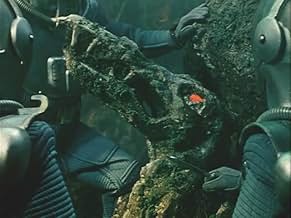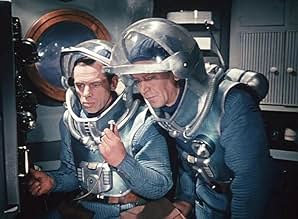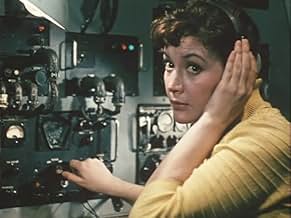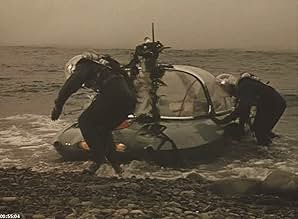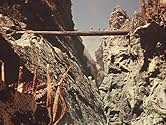Planeta bur
- 1962
- 1 घं 18 मि
IMDb रेटिंग
6.3/10
1.6 हज़ार
आपकी रेटिंग
अपनी भाषा में प्लॉट जोड़ेंCosmonauts land on the planet Venus. However, they find themselves in danger from the voracious monsters they find on it.Cosmonauts land on the planet Venus. However, they find themselves in danger from the voracious monsters they find on it.Cosmonauts land on the planet Venus. However, they find themselves in danger from the voracious monsters they find on it.
- निर्देशक
- लेखक
- स्टार
फ़ीचर्ड समीक्षाएं
This is the first real Russian science fiction movie. I appreciated that it includes almost no ideological trash from the cold war, despite the time of its creation. The crew even includes one English speaking person, Mr. Kern. Mr. Kern is not as perfect as other members of the crew, but he is still a positive figure. What I liked was that this is real SF, and no mainstream movie with "magic" elements: there is space flight, there is an intelligent robot, there are fights with (quite funny) dinosaurs and pterodactyles, there are Venusians aliens and there is speculation about one solar race living on various planets but with common roots. It has all a SF fan can wish. (Except for time travelling and cyberpunk).
Not bad, not incredible like "Forbidden Planet" and not as colourful and tragic as "This Island Earth" and it is certainly not "Solaris". But we must give 60s Eastern bloc science fiction its due. None of it is bad. All of it respects the intelligence of the viewers and each manages to create effective atmospheres. The music and background sound were good. The robot and the "supercar" are dated but very good for the time. Naming the robot "John" is a bit of a dig at the West (one could just as easily see Westerners naming a robot Ivan or Igor). The robot is given a Western name while the crew are all self actualized socialist men except for the woman cosmonaut who is given the traditional role of minding the mothership and lamenting over the fate of the men who are off exploring the planet. If that and the song are the social commentary then it could have been much worse.
It is a bit odd having a robot named John speaking monotonic Russian, but this is a pretty interesting film. I also found it interesting that a couple of English phrases were tossed in on occasion. This is not at all what I was expecting, which was something along the lines of "OUR space program is better than YOUR space program", considering the year this was made. However, there was only one passing reference to any political/ideological struggle, and that was probably thrown in to appease whatever Soviet film board that had to give its approval to this movie. I would recommend this one for any sci-fi junkies out there who like to see what other countries did with the genre.
It doesn't compare with modern day films at all, but then one shouldn't try to, should one? Gee they all (and probably "we too") took themselves so seriously those days!!
I'm confused by one previous commentator who said the film was in black and white. Maybe her TV was, but the film as I saw it last night certainly was in colour (well, 1960s colour, anyway).
One quote from the film certainly is worth commenting. That's where they are speculating that there may have been creatures who crashed their spaceship a long time ago and then turned feral. The character comments that they would have had "no culture". Well, that's the Eastern European way, isn't it? Culture is so important; but what they can't seem to perceive, so useless. As author Stephen Coonts said of the Russians: "They can all write poetry but not a single one of them can change a light bulb" (well something like that, anyway).
But putting that to one side, yes a most interesting and well-made film of its time. The singing absolutely blew me away. Not the quality of the singing, I mean the fact that they had singing at all in what otherwise seems to me such a "serious" movie!
I'm confused by one previous commentator who said the film was in black and white. Maybe her TV was, but the film as I saw it last night certainly was in colour (well, 1960s colour, anyway).
One quote from the film certainly is worth commenting. That's where they are speculating that there may have been creatures who crashed their spaceship a long time ago and then turned feral. The character comments that they would have had "no culture". Well, that's the Eastern European way, isn't it? Culture is so important; but what they can't seem to perceive, so useless. As author Stephen Coonts said of the Russians: "They can all write poetry but not a single one of them can change a light bulb" (well something like that, anyway).
But putting that to one side, yes a most interesting and well-made film of its time. The singing absolutely blew me away. Not the quality of the singing, I mean the fact that they had singing at all in what otherwise seems to me such a "serious" movie!
I'm of the opinion that film is powerful, powerful enough that large segments of our imagination is guided by cinematic relationships. That even the nature of reasoning is affected, even as deeply as how we reinvent practical logic. There are lots of examples to show and arguments to be made -- they are in a collection I am incubating.
Science fiction is a special case, at once more obvious. Not all as subtle as what I study. But surely it had as profound an effect on daily lives.
To understand this film, you need to know some history. Alas, many readers will not appreciate the cold war that was the overriding impetus for the two largest political entities from the 50s through the 80s.
Some dates for you. In 56, the US saw "Forbidden Planet," with a superintelligent robot, space travel and mind augmentation. It was based on Shakespeare's most interesting play and is still among the best scifi films.
In 57, Russia launched a satellite and declared that they "owned" space (and would put nuclear bombs over the US ready to "drop"). Also, that soon, they would have men in space.
In 58 one of the most successful Russian filmmakers (Klushantsev) made a film about "cosmonauts" and space travel that was enormously successful with the Russian public (and their captive peoples). That film was the beginning of a deeper than usual partnership between Klushantsev and the propaganda arm of the Kremlin.
In 1960, an unknown in East Germany made a film (Road to the Stars) about cosmonauts on Venus. It was a runaway hit. In the following year, Kennedy made his famous pledge to put an American on the moon by the end of the decade.
The Soviet moon program had some catastrophic disasters, in large part resulting from lies told to the old Stalin regime by Soviet scientists working on ballistic missiles supposedly (but not really) capable of destroying the US. Khrushchev had these scientists destroyed or imprisoned. That meant no moon program.
But the people already were convinced that Venus was the prize, so the space propagandists seized on this and retooled their manned program as a race to Venus, forget the moon. As a consequence, Klushantsev was given a (for the times and conditions) vast budget and told to make a film of the heroic Soviet nation exploring Venus. This he did in the film you'll see here if you can find it.
Our intrepid crew is asked to make the Soviet people proud, a promise they come back to a few times. There's a robot, clearly stolen from "Forbidden Planet."
The thing revolves around there being life on Venus. Just as they take off, they find proof that the life consisted of humans. Afterthey leave, we see a beautiful woman appear. Then, as the spacecraft flies home, we have a few minutes of a Soviet heroes song in that militant, deliberately fake spontaneous joyous tone of the times.
The effects developed by this team would be used in strange circumstances for the next 8 years. This crew filmed fake footage of real spaceflights. The Kremlin was never so bold as to fake a success when everyone knew the missions ended in fiery death. But they did decorate their successes with these true-fake movies. The most famous was the 65 spacewalk of Leonov, wonderfully believable until you wonder who is holding the camera. Oddly, the propagandists assumed that the camera eye was such a magical omnipresence that no one would ask.
Anyway, this film was somehow procured by the infamous Roger Corman. He shortened it and dubbed in English. He substituted the blank female (who says in an orbital craft) with an even more blank female. One wonders why; Faith Domergue had been hot 15 years earlier but here is wallpaper. And he adds an earthside leader who radios a few times, played by the already embarrassing Basil Rathbone. Something interesting could be said about his Sherlock Holmes here.
Kubrick's 1968 2001, used many conventions from this shop, even when they went against the science of the thing. And ever since, on through "Star Wars," we have that single vision of what space SHOULD look like.
Ted's Evaluation -- 2 of 3: Has some interesting elements.
Science fiction is a special case, at once more obvious. Not all as subtle as what I study. But surely it had as profound an effect on daily lives.
To understand this film, you need to know some history. Alas, many readers will not appreciate the cold war that was the overriding impetus for the two largest political entities from the 50s through the 80s.
Some dates for you. In 56, the US saw "Forbidden Planet," with a superintelligent robot, space travel and mind augmentation. It was based on Shakespeare's most interesting play and is still among the best scifi films.
In 57, Russia launched a satellite and declared that they "owned" space (and would put nuclear bombs over the US ready to "drop"). Also, that soon, they would have men in space.
In 58 one of the most successful Russian filmmakers (Klushantsev) made a film about "cosmonauts" and space travel that was enormously successful with the Russian public (and their captive peoples). That film was the beginning of a deeper than usual partnership between Klushantsev and the propaganda arm of the Kremlin.
In 1960, an unknown in East Germany made a film (Road to the Stars) about cosmonauts on Venus. It was a runaway hit. In the following year, Kennedy made his famous pledge to put an American on the moon by the end of the decade.
The Soviet moon program had some catastrophic disasters, in large part resulting from lies told to the old Stalin regime by Soviet scientists working on ballistic missiles supposedly (but not really) capable of destroying the US. Khrushchev had these scientists destroyed or imprisoned. That meant no moon program.
But the people already were convinced that Venus was the prize, so the space propagandists seized on this and retooled their manned program as a race to Venus, forget the moon. As a consequence, Klushantsev was given a (for the times and conditions) vast budget and told to make a film of the heroic Soviet nation exploring Venus. This he did in the film you'll see here if you can find it.
Our intrepid crew is asked to make the Soviet people proud, a promise they come back to a few times. There's a robot, clearly stolen from "Forbidden Planet."
The thing revolves around there being life on Venus. Just as they take off, they find proof that the life consisted of humans. Afterthey leave, we see a beautiful woman appear. Then, as the spacecraft flies home, we have a few minutes of a Soviet heroes song in that militant, deliberately fake spontaneous joyous tone of the times.
The effects developed by this team would be used in strange circumstances for the next 8 years. This crew filmed fake footage of real spaceflights. The Kremlin was never so bold as to fake a success when everyone knew the missions ended in fiery death. But they did decorate their successes with these true-fake movies. The most famous was the 65 spacewalk of Leonov, wonderfully believable until you wonder who is holding the camera. Oddly, the propagandists assumed that the camera eye was such a magical omnipresence that no one would ask.
Anyway, this film was somehow procured by the infamous Roger Corman. He shortened it and dubbed in English. He substituted the blank female (who says in an orbital craft) with an even more blank female. One wonders why; Faith Domergue had been hot 15 years earlier but here is wallpaper. And he adds an earthside leader who radios a few times, played by the already embarrassing Basil Rathbone. Something interesting could be said about his Sherlock Holmes here.
Kubrick's 1968 2001, used many conventions from this shop, even when they went against the science of the thing. And ever since, on through "Star Wars," we have that single vision of what space SHOULD look like.
Ted's Evaluation -- 2 of 3: Has some interesting elements.
क्या आपको पता है
- ट्रिवियाThis movie is later edited and dubbed as "Voyage to the Prehistoric Planet", released in the US in 1965. This movie (and the Russian inserts) were in turn used to create "Voyage to the Planet of Prehistoric Women" (1968)
- इसके अलावा अन्य वर्जनFor the U.S. version, titled Voyage to a Prehistoric Planet (1965), all footage of Kyunna Ignatova has been removed and replaced with footage of American actress Faith Domergue playing the same part.
- कनेक्शनEdited into Voyage to the Prehistoric Planet (1965)
टॉप पसंद
रेटिंग देने के लिए साइन-इन करें और वैयक्तिकृत सुझावों के लिए वॉचलिस्ट करें
- How long is Planeta bur?Alexa द्वारा संचालित
विवरण
- चलने की अवधि
- 1 घं 18 मि(78 min)
- ध्वनि मिश्रण
- पक्ष अनुपात
- 1.37 : 1
इस पेज में योगदान दें
किसी बदलाव का सुझाव दें या अनुपलब्ध कॉन्टेंट जोड़ें

